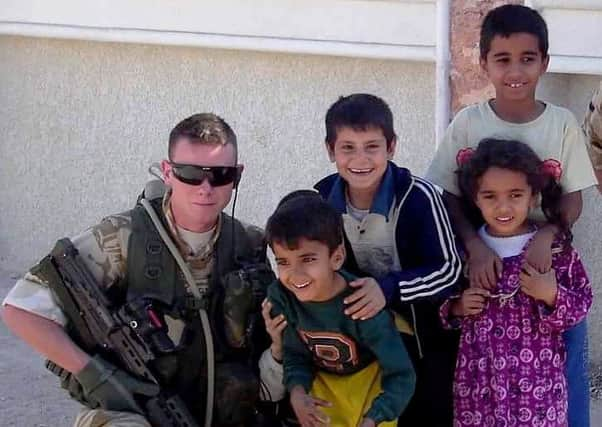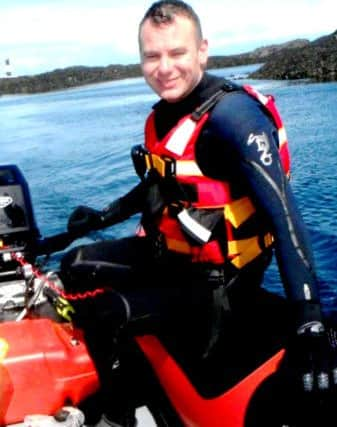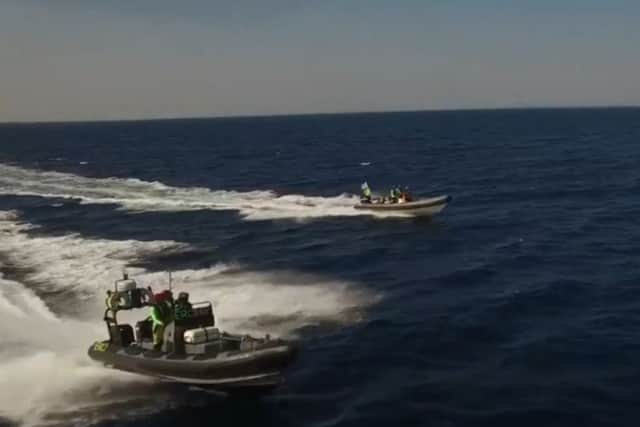NI ex-soldier: '˜I'd probably risk my life to flee Syria too'


Ryan Gray, 30 and from Bangor, said that his month-long mission will involve him being on call for 24 hours a day on the Greek island of Lesbos, which has become a frequent landing ground for refugees crossing from Turkey.
He had been posted to Iraq during his time in the military, and said that it has given him an insight into why so many people are attempting to flee the Middle East.
Advertisement
Hide AdAdvertisement
Hide AdNow working for the Northern Ireland Coastguard, the father-of-one said that if he were facing the kind of brutality which many Syrian or Iraqi citizens face, he “probably would take the chance” of jumping into a rickety vessel and making a potentially-lethal journey across the waves.


He will be living in a house run by the charity ERCI (Emergency Response Centre International) close to their lifeboat station throughout his stay.
Mr Gray – who has a four-year-old son who just started P1 on Thursday – said that he has already been warned about the number of children he will encounter on his rescues.
“It makes it a little bit more, probably, challenging if you’re dealing with the kids,” he said.
Advertisement
Hide AdAdvertisement
Hide Ad“There’s obviously the possibility of fatalities in young children. The guys out there see quite a lot of that.


“It’ll be an eye-opener I’m sure.”
He had signed up to the Army in 2002 and left in 2009, after serving two tours of Iraq with the Royal Signals.
He left the Army with the rank of Lance-Corporal.
Anti-refugee sentiment is said to be growing across the continent, fuelled by concerns about who many of those trying to enter Europe are; whether they are motivated by an economic desire to move, by fear of persecution and conflict, or anything else.


Asked about some people’s antipathy towards refugees, Mr Gray said: “Everybody is entitled to their own opinion, and will have their opinions for their own reasons.
Advertisement
Hide AdAdvertisement
Hide Ad“Certainly with me having been in Iraq twice, I know what it’s like.
“I just think people should, before they go on and make comments, understand the subject fully; understand why these people are fleeing.”
He said he was “not saying everybody should come here; definitely not”.


“I’m going out there for purely one reason,” he said.
“That’s to stop people from drowning in the sea and trying to help them as much as I can: to save lives.”
Advertisement
Hide AdAdvertisement
Hide AdHe said he had researched the situation in the Middle East for about two years.
“All I would say is: If I had my family there, I’d be doing the exact same thing,” he said.
Asked if he would even embark on one of the very dangerous crafts which have cost countless people their lives – vessels he described as “massively overcrowded with no lifejackets” – he replied: “It’s so hard to say unless you’re put in that situation.
“Certainly some of the things I’ve read about, and some of the things [I’ve] seen – from Syria mostly – I probably would take the chance of putting myself and my family on one of those boats if it meant the chance of getting to safety...
Advertisement
Hide AdAdvertisement
Hide Ad“I think you’d really need to be there. Certainly some of the things I’ve seen, if it’s as bad as it looks, I’d certainly be trying to flee that country any way I could.”
PERSONAL SACRIFICE:
Ryan Gray’s trip to Lesbos is being undertaken entirely at his own expense.
The flights to Greece have set him back £350, and he will also have to pay for airport parking, food, and more.
All told, the cost is expected to run to a minimum of £600.
Advertisement
Hide AdAdvertisement
Hide AdIn addition, it has cost him about four weeks’-worth of leave from his job – essentially all of his holiday time for the whole year.
He said he “made his mind up” that he wanted to help out when he saw the now-famous image of a small child, Alan Kurdi, who had washed up dead on a Turkish beach on September 2, 2015 after being taken to sea in a bid to reach Europe.
Mr Gray had aimed to go out last year, but his father had become terminally ill, and has since died.
Speaking to the News Letter ahead of his trip, which was expected to see him leave at 4am today, was asked what his family make of it.
“My family are certainly very supportive,” he said.
“A little apprehensive I suppose.”
The charity he is working with have two life boats.
Advertisement
Hide AdAdvertisement
Hide AdHe said that whenever a refugee vessel (often just an inflatable raft) is spotted at sea, the boats will be dispatched to help try and guide them to shore safely.
If the craft is in trouble and people are jumping overboard, the lifeboats will try to take them on board.
Mr Gray said his job is expected to involve swimming out to anyone in that situation, in order to help stop them from drowning.
REFUGEE CRISIS IN NUMBERS:
As of August 28, the UN refugee acency – known as the UNHCR – said that more than 161,000 people had arrived in Greek territory by sea so far in 2016.
Advertisement
Hide AdAdvertisement
Hide AdOf this number, Syrians were the largest group by an overwhelming margin.
They make up roughly 48% of the total.
Next on the list were Afghans (25% of the total), followed by Iraqis (15%).
Other notable numbers of people had come from Pakistan (4%), and Iran (3%).
Of these new arrivals in Greek territory, 38 per cent were children, 41 per cent were men, and 21 per cent were women.
Advertisement
Hide AdAdvertisement
Hide AdIn total across the Mediterranean, the UNHCR records that another 106,000 people have arrived in Italy by sea this year, and another 3,000-or-so arrived in Spain.
However, in Italy the picture is quite different.
Most of those arriving by sea there are from Africa – mainly Nigeria – and 70% are men.
In September, 2015, the then-Prime Minister David Cameron announced 20,000 people from Syria would be allowed to settle in the UK.
In April this year, leading Tory Chris Grayling was quoted as saying in the Telegraph: “I am concerned that the flow of people into Europe, most of whom we know absolutely nothing about...
“There has already been some evidence militants are using refugee flows as a conduit to get into Europe.”